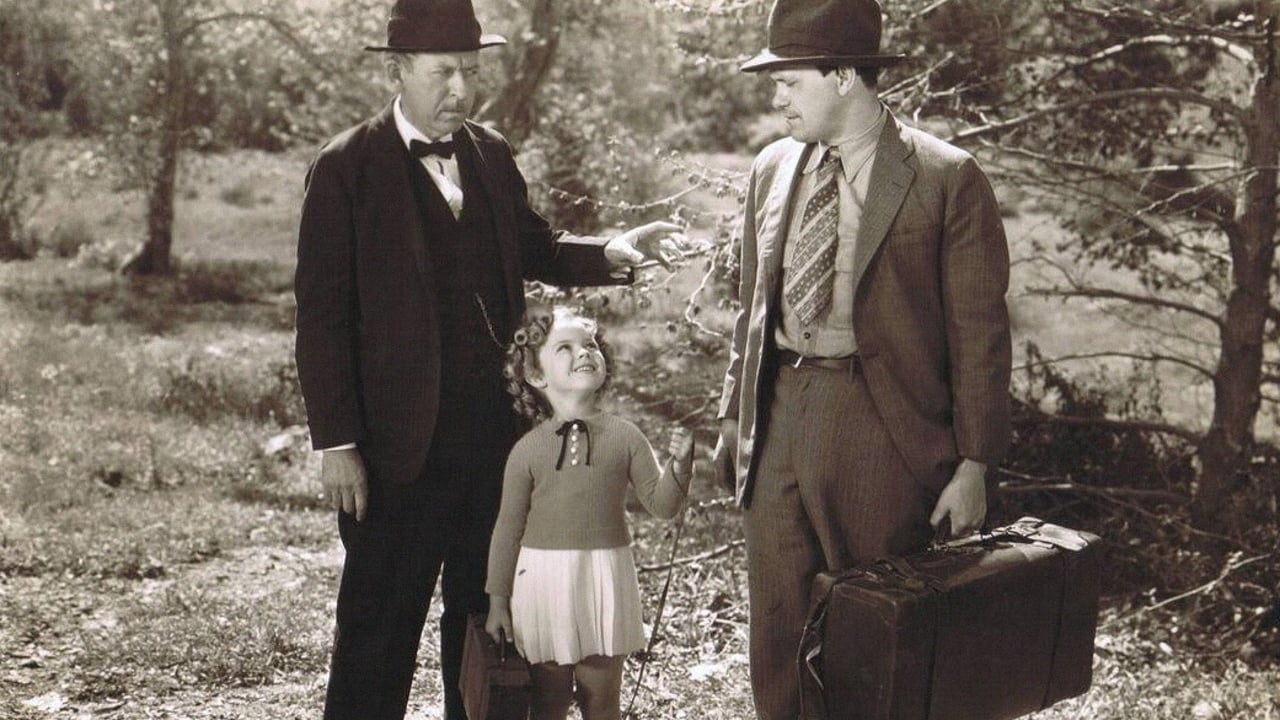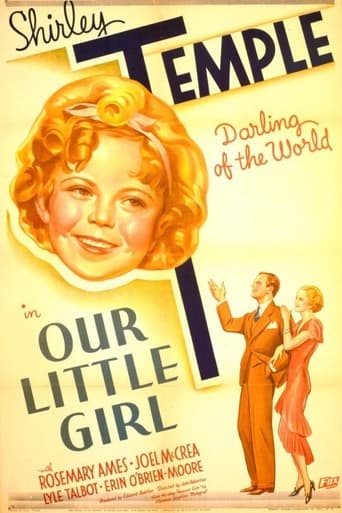



Charming and brutal
It is not deep, but it is fun to watch. It does have a bit more of an edge to it than other similar films.
View MoreAs somebody who had not heard any of this before, it became a curious phenomenon to sit and watch a film and slowly have the realities begin to click into place.
View MoreThis is a must-see and one of the best documentaries - and films - of this year.
View MoreDuring this film, a love quadrangle develops, then dissipates at the last moment. The wife and Doctor husband love each other, and have a 6 year old girl(Shirley), but the wife feels unfulfilled, now that her daughter is less dependent on her, and she doesn't have a job to keep her busy. She is distraught by her cramped social life, with her husband working long hours on his patients and his research. The husband's current nurse is in love with him, but the husband seems not interested in her romantically, although he much appreciates her. The husband's playboy friend strikes up a friendly relationship with the wife, and they spend more time together, mostly at sports, than does the husband and wife. Eventually, they imagine they are in love, and make plans for a quickie divorce and marriage, with Shirley living with the wife and new husband. But Shirley doesn't like her stepfather-to-be, partly, because he "doesn't know how to be a daddy". So, Shirley packs up a few things and hits the road with her little dog. She comes upon a talkative tramp who inquires about her destination. She's going to her favorite picnic spot, by a stream. The husband comes upon the tramp and is told where she says she's going. The wife isn't far behind. They find her unharmed, enjoying her lunch, and decide it's best for Shirley if they don't separate. The 3 end happily reunited.The problem with the screenplay is that nothing has been solved. The husband, wife and Shirley are in the same situation they began with. So, how long is their new found bliss going to last? One obvious solution is for the wife to get a job to keep her busy. But, perhaps she would only be happy working as a nurse, as she did before Shirley was born. But, this is a small town, so there may not be any openings for a nurse. Hubbie likes his current nurse and doesn't want to give her up. So, perhaps they would have to move to a city to find a nursing job. Another possibility would be to have another child, if this was agreeable to both. Still another possibility is to get active in several organizations.This is a very unusual S.T. film, in that she has both parents all the way through. I'm surprised the Hays commission allowed this theme. I've read they frowned on divorce subjects, although there was no actual divorce here. In most of Shirley's films, she's an orphan or missing one of her parents. In no case I'm aware of was the parent missing because of divorce.If you want to see and hear Shirley sing and dance, this isn't the right film. If you just enjoy the cute, vivacious, little girl, this film may satisfy you.
View MoreOUR LITTLE GIRL (Fox, 1935), directed by John Robertson, a domestic drama taken from a story "Heaven's Gate," stars Shirley Temple, Joel McCrea and someone by the name of Rosemary Ames (in her final screen appearance following a very brief movie career). Similar in theme to RKO Radio's WEDNESDAY'S CHILD (1934) that revolves around a boy (Frankie Thomas) whose happy home is disrupted by the separation of his parents (Edward Arnold and Karen Morley), OUR LITTLE GIRL centers around the moppet Temple facing the same situation of her own, but without any courtroom or child custody battles, which might have helped quicken the pace or added more interest to a somewhat slow scenario.Set in a small town, the plot introduces the Middletons as a happy family: Donald (Joel McCrea), a respectable doctor; Elsa (Rosemary Ames), his loving wife, and their little girl, Molly (Shirley Temple) who looks forward to their twice a year family picnic each May and September Saturday at a park called Heaven's Gate. Donald works long and hard on his experiments along with his assistant, Sarah Boiton (Erin O'Brien-Moore), a nurse who's secretly in love with him. Because he's away from home too often, Elsa spends much of her lonely hours with Rolfe Brent (Lyle Talbot), her former horse breading beau who recently has moved into town from Europe. Due to Donald's misunderstanding and jealously towards Elsa and Rolfe, the couple argue, leading little Molly to find herself caught in the middle of things, and unable to comprehend why her father will no longer be living with them anymore. After overhearing a conversation between her mother and Rolfe that has her believing that she's the cause for her parent's separation, Molly decides to take matters into her own hands by leaving home.A minor Temple drama with little of the Temple formula intact. Aside from singing a lullaby to her doll and later playing Stephen Foster's "Banjo on My Knee" on the piano, there are no songs nor dance numbers. Considering its theme, song interludes have no precedence in the story, though some slight doses of humor including Temple on the seesaw with her dog, Sniffy, as examples that keep the narrative from becoming strictly melodramatic. Unlike her more recent releases, OUR LITTLE GIRL, is the only one of Temple's leading roles that can be categorized as strictly "B" product, considering it being the shortest (63 minutes) of her starring film roles.Others in the supporting cast consist of Poodles Hannerton as the Circus Performer; Margaret Armstrong (Amy, the Middleton housekeeper); Ruth Owin (Alice) and Leonard Carey (Jackson), each as Brent's servants; and best of all, J. Farrell MacDonald billed as Mr. Tramp, playing a homeless man who comforts little Molly by listening to her story as to why she's leaving home. This little scene is well handled, with some humor in spoken dialog by Shirley thrown in for good measure. Watch for it. OUR LITTLE GIRL became one of many Temple movies to become available on video cassette during the late 1980s and then on DVD in both black and white and colorized formats. Formerly presented on The Disney Channel in the 1980s in colorized version, it then turned up on American Movie Classics as part of its Sunday morning "Kids Classics" (1996-2001), and finally on the Fox Movie Channel in its original black and white format. Bob Dorian, former host of AMC, once commented in his profile about OUR LITTLE GIRL in saying that its working title "Heaven's Gate" had been changed prior to release due to it the name suggesting a cemetery, leaving an indication as being a movie about death.Although OUR LITTLE GIRL didn't turn out as interesting as the rarely seen WEDNESDAY'S CHILD (1934), nor become the Academy Award winner as KRAMER Vs. KRAMER (1979), it's one of those little movies that might have been better had it not been hampered by a weak script. Had it not been for "Our Little Girl" Shirley Temple in the title role keeping the story alive with her know-how performance, then this minor effort of hers would certainly have ended up along with many old Fox Films to be either lost, forgotten or both. (**1/2)
View MoreEven today, it's doubtful that anyone settling down to a Temple movie will have 'accidentally' stumbled upon it whilst browsing, and knows what they're letting themselves in for. Temple's vehicles are a sub-genre of their own and, in terms of cinematic artistry, are amongst the kind of films who's best critics by far are their own core audience.The plot of OLG seems the kind of mawkish fare that Miss Curly Top was a dab-hand at resolving with a starry smile and a twinkly eye - mum and dad's marriage hits the rocks, divorce beckons following infidelity, and Shirley is of course caught up in the middle of it all.This particular entry somewhat subverts the given formula however, and throughout the film's brief hour-long running time the perspective is in the main unusually dour. Whilst we're not exactly talking 'Requiem For A Dream', there is no sanguine song-and-dance routine to make everything alright here. It takes a runaway Shirley, one of those stock-character post-depression aphoristic hobos, and much wincing solemnity on the part of respected Thesps McCrea and Ames to win the day.Director Robertson apparently chose not to heed WC Fields' advice regarding children and animals, having already directed a version of 'Annie' in 1932, and having to contend with a lot of one and a little of the other here too. One has to wonder whether there was any sadistic pleasure taken in the fabled 'dead animals' factor necessary for Temple's required tears quota, which on this occasion would certainly have been higher than usual.
View MoreOUR LITTLE GIRL struggles valiantly to understand why her loving parents can no longer love each other.Little Shirley Temple, Hollywood's greatest star at the time, enlivens what might without her have been just another soap opera. With smiles & tears, she beguiles the audience into completely identifying with her joys & tribulations. Even in a minor picture such as this, her abundant charm & talent still bare testimony to her utterly unassailable niche in American film history.As her parents - and it's rare for Shirley to have both throughout an entire film - Rosemary Ames & Joel McCrea both nicely underplay their roles, providing strong assistance to Shirley but without overshadowing her, as is proper. McCrea's medical researches & Miss Ames' horseback riding are mere contrivances used to move the plot along - they are never allowed to eclipse the Tiny Tot.Lyle Talbot & Erin O'Brien-Moore deftly play the significant others in the lives of Shirley's parents; thankfully, each is presented gently, leaving the story without any unnecessary abrasion. Wonderful character actor J. Farrell MacDonald sparks the end of the film with his sympathetic portrayal of a wise, friendly tramp.
View More